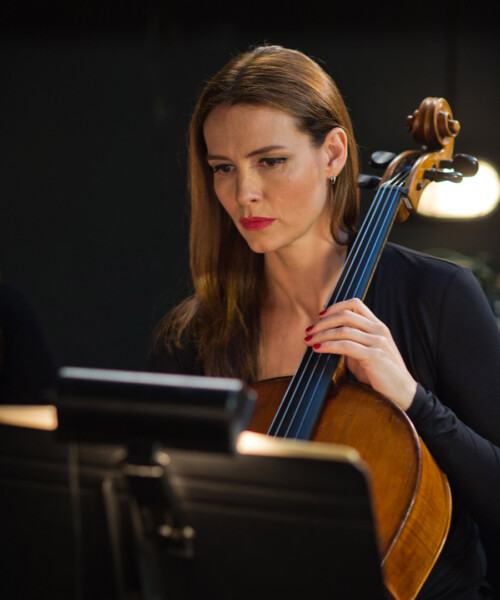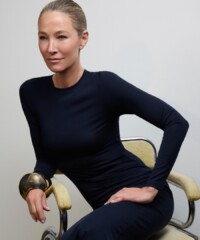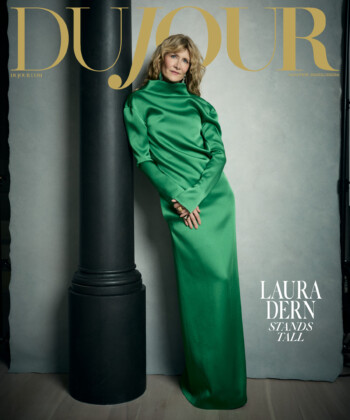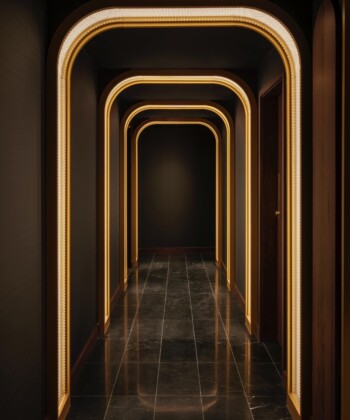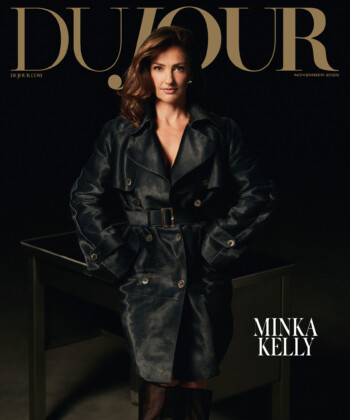On the surface, an orchestra is a thing of beauty. It’s a well-oiled machine made of highly trained cogs all working together to churn out some of the world’s most listenable music. Behind the scenes, well, that’s a different story.
On Amazon’s new series Mozart in the Jungle—
I want to ask you what appealed to you about joining this series, which follows the misbehavior of a New York orchestra, but I can’t really think of what wouldn’t be appealing.
I was told that this story was being written and that the people who were involved were Jason Schwartzman, Roman Coppola, Paul White and Alex Timbers, and I thought that was an incredible combination for a creative performance, and then I also thought why hasn’t anyone done this before? What a wonderful idea to tell a sort of dramatically funny story about the classical music world in New York. And then this character is written in a rather complex way, and I thought I couldn’t wait to play her.
She’s a cellist in the orchestra who moonlights at a horrible Off-Broadway show and seems to be just getting by. Her personal life isn’t in much better shape.
What was appealing was how complicated she is and her refusal to be defined by anyone besides herself. I think she’s gotten to a point where she’s so good at what she does, but she still has to work incredibly hard to stay there. Her relationship to her talent is interesting to me because she doesn’t question that. She questions other things in her life, but not that.
Were the musicians you spoke to in your research thrilled to expose you to their world?
Carter Brey, who’s the principal cellist at the New York Philharmonic, has been spending time with me and giving me some sessions where we talked about music, and we practiced together a little. One session we had together was just not even touching our cellos, but it was more like a flamenco class where we clapped and stamped our feet and sort of hummed and sang. It was about breathing and the comfort of the body. It was fantastic! And, I’ve been very lucky because the New York Phil has invited me in and I’ve watched rehearsals and sat down with them and seen backstage and how things work there. It’s been amazing.
And are they anxious to reveal the dark underbelly?
Yeah, absolutely. If you work that hard on something from such a young age, you’re hot housed in some way, whether it’s of your own volition or not. I think there’s a moment where something’s got to burst. Cynthia is kind of night owl, and what I know from doing theater is that you have to wind down from a performance.
Do you see any parallels between working as an actor and the characters working in the symphony?
I remember being on one of my first films and going to work in the van in the morning with some other actors, and I was so excited to be there that I think I talked the whole way from the hotel to the set. I just talked about anything: the sky, the clouds, the weather, the Dublin lights. And my fellow actors just didn’t think much of me. They probably thought, would you just shut up? So I’ve definitely been the subject of the withering scorn a couple of times when I showed up all fresh-faced.
You all learned to some degree to play your character’s instruments for this show. Who among you do you think has become the best?
Well, I cannot boast that. I mean, certain instruments require certain levels of technique; the thing about the cello is that you can’t really fake it. You certainly can’t pretend like you’re bowing well, you have to bow well because it’s such a large instrument. So, I did learn very small excerpts from great pieces of music. They’d say you must learn 90 seconds of this or 60 seconds of that, and each week we’d have to learn a new piece. I don’t know how good I became, but I did learn those pieces.
Any chance you’re going to keep it up once cameras stop rolling?
I hope so. You know, we wrapped a month ago and I just gave my practice cello back. It was standing in the corner of my room for all this time, and I really miss it. And, I imagine I may well keep going to the lesson.

























